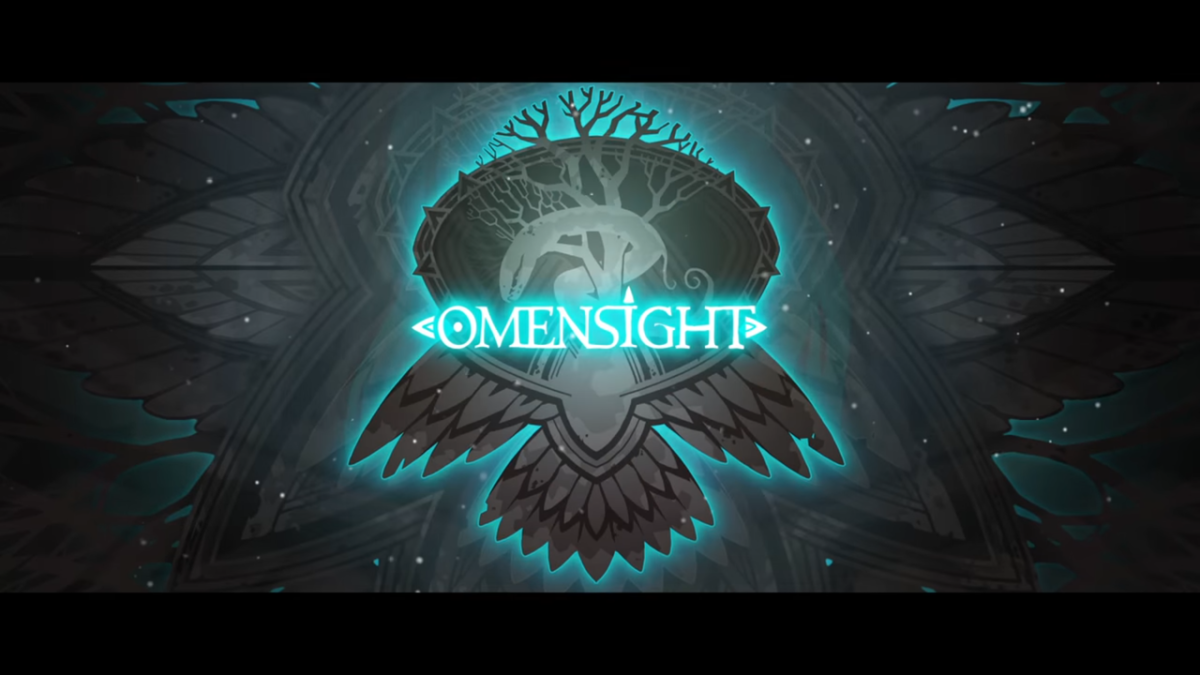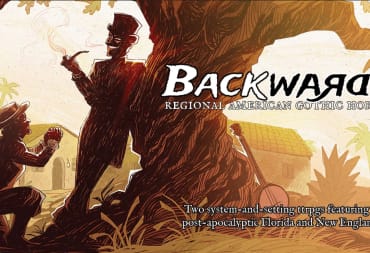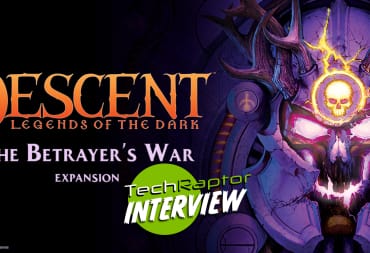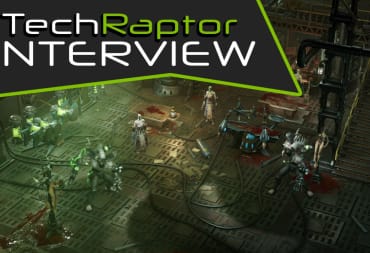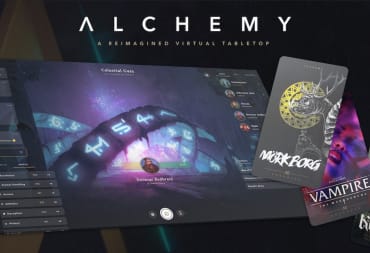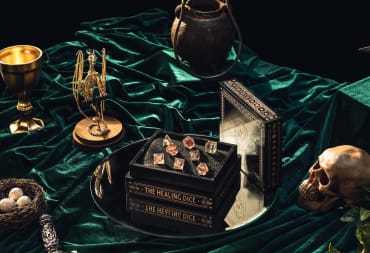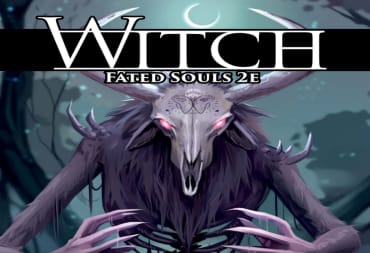When I first played Stories: The Path of Destines, I found a clever game that, while it had some issues, certainly tried to be different. I feel like I don't see many games willing to mess with storytelling in the fashion that Stories tried. A few years later, it was followed by Omensight, a sequel that managed to keep the most interesting aspects of Stories while improving on the game in many ways. I decided that I wanted to know more about both game's development and the developers behind it. So we reached out to Spearhead Games, and I got a trio of interesting people to talk to. I had a chance to chat with co-founder Atul Mehra, co-founder and creative director Malik Boukhira, and game designer Philip Tam about many interesting subjects.
TechRaptor: So, Spearhead Games! Why don't you just tell me how the studio started?
Malik Boukhira: So when was it, six years ago?
Atul Mehra: Yes. October 10th.
Malik: October 10th, that was the official date. Well, before that both Atul and myself were working at EA Montreal, before it was Motive because at some point it shut down. Philip was also there at that time.
Philip Tam: Yep.
Malik: So it all started at EA. But yeah, basically the studio was shutting down and, well, we started thinking that's an opportunity to do something different, interesting. Do things differently in terms of how we make games, the type of games we make, smaller and all that. Yeah. Basically we got together and started this, with the intention that we wanted to do innovative games on a smaller scale that we can actually experiment and try things differently, but also in the way that how we make games. We felt like with a smaller team we could do something interesting in terms of how people work and how we work in general. That's always an on-going thing.
TechRaptor: So you started the studio, and your guys' first game was Tiny Brains.
Philip: Oh yeah!
TechRaptor: I don't think most people remember.
Malik: Yeah we do. It was quite an adventure, the first game. So obviously we've made games before, but never just ourselves. You know it was technically a smaller game than the big AAA we're used to working on. There was a lot of things we didn't know back then, so I guess it was a trial by fire. So...
Atul: Severely overscoped.
Malik: Yeah. So yeah. So we shipped a four player co-op game.
Atul: Jump in, jump out.
Malik: Online. And also it was a launch title of the Ps4, and we did all that in less than a year.
TechRaptor: Jeez.
Atul: Multiplatform. Ps3 and PC too.
Philip: On the Unreal Engine 3, which did not support Ps4.
Atul: It was not officially supported on Ps4.
TechRaptor: Oh boy.
Malik: Did I mention it was physics based online? So, yeah, which was not an easy thing to do. So yeah! We actually did deliver all that, but it wasn't easy by any means. But we learned a lot from that. It was a pretty cool game. People still play it, and it's fun.
TechRaptor: Now you guys said the Unreal Engine 3 wasn't supported by the PlayStation 4. How do you get around that?
Philip: A lot of coding. A lot of manual programming to make it happen.
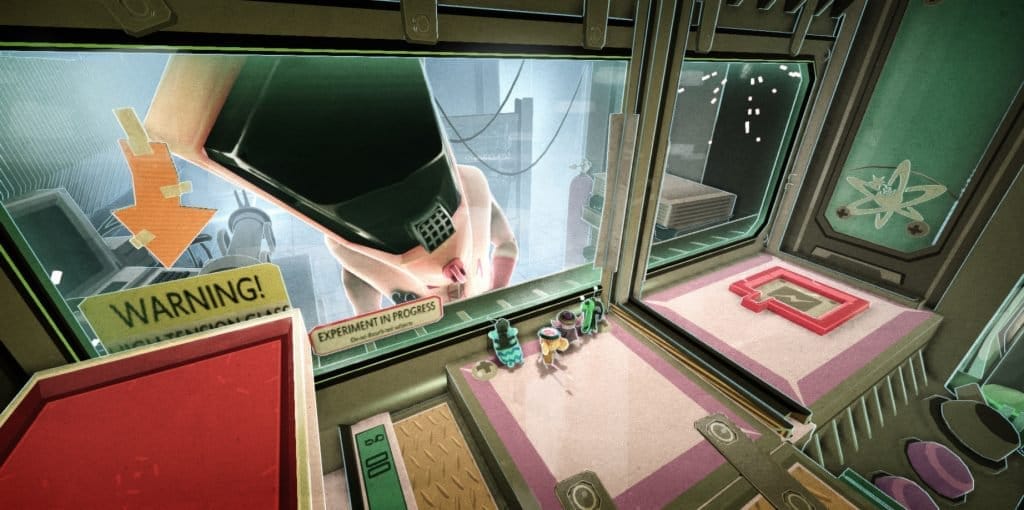
TechRaptor: Now when it comes to Tiny Brains, how did, basically, you guys decided "oh, lets make this four player co-op physics based online launch title"?
Malik: Initial... well, about the launch title aspect, it wasn't part of our plan. We just wanted to release it on Ps3 and Xbox Live Arcade back then. But the timing was such that by the time we'd release the game the Ps4 would basically be out the same day, so we said "okay, guess we need to support that new platform as well", and we had that publisher back then, which was 505 Games, and they were keen on that as well so we went along.
As far as four player co-op, well, you know, we were inspired by various co-op games, indie titles, I don't know... what was the name of that game, I have a blank...
Atul: Castle Crashers?
Malik: Castle Crashers! For example, things like that. We love co-op so we wanted to do something around that, but obviously we wanted to do something different so we made an action puzzler. So it's a four player physics based co-op game. So yeah, we couldn't just do a hack-and-slash or anything like that. But yeah, back then it makes sense to go with these types of games and because we liked the genre ourselves. Back then we played a lot of co-op games among the designers and all that, so it felt like a natural thing. Lets do a co-op game we'd enjoy ourselves and hopefully other people will enjoy, because we pushed a lot about making really deep co-op accessible to a vast variety of players and that's something the game does pretty well. You can basically have a very hardcore player, like a super veteran gamer, play with kids and they will have fun together because the mechanics themselves are simple but there's a lot of depth in how you play the game because it's physics based and it's puzzles. So it actually was a great party game because of that, you can have a lot of fun with a group of players in couch co-op.
TechRaptor: Awesome. So Tiny Brains happened, and then your next game was Arena Cyber Evolution, which is very different from Tiny Brains. This one being a "MOSA".
Malik: Yeah. It didn't start, initially, that different, in the sense that we had two vs. two competitive sort-of soccer game in Tiny Brains, it was a side mode. That actually turned out to be really fun because the characters in Tiny Brains had super powers, like force push and various physics-based powers. It was a lot of fun. It was a, I guess, weird precursor to Rocket League or something.
So going from there we said "hey lets push that aspect, competitive team-based physics-based game like soccer or something like that with super powers." That was the initial idea for ACE: Arena Cyber Evolution. The game evolved over time. It turned out to be more hockey than soccer initially. I don't know, maybe because we're Canadians and we like hockey. But yeah, it was another quite ambitious game because we did want to make something that was, you know, online, competitive, even an esport even thought we can't say somethings an esport sort of.
We had a lot of cool ideas, like having the spectators interact with the match. We saw the trend of spectatorship coming up back then, so we wanted to work on that and push that. How can we make games even more entertaining to watch than just passively? Now I think it's becoming a trend, but back then we were way ahead. I think that was one of the things with that game, it was way ahead of it's time.
Philip: At least three years ahead.
Malik: Yeah. Because, you know, we always want to do innovative things, but with that game we learned that too much innovation is not necessarily good because no one understands it, and it's very hard to sell and push. The game came out before Rocket League and it had that same kind of physics-based mechanics, it had spectator interaction before it was a thing...
Atul: We also pushed the open development aspect on Twitch. So people were essentially playing... early, very early on, they were playing a pre-alpha, pretty much like a beta. We'd prototype a build of the game and they would give us feedback based on that. This was way before Twitch had their... what's it called now? Creative? Programming section. Because we asked them, and they said "no", then Unreal showed up and they were like "yeah, sure." So, yeah, a lot of that stuff we're proud to say we were ahead, but yes also we were too much ahead.
Malik: Yeah. And obviously a small indie studio doesn't have the firepower to push trends, basically. You need big guys to actually make that happen. So even though we went to some people to... we went to Twitch for example to talk about spectator interaction, but they wouldn't do stuff for us, and it took them a while to get that operation power to push that internally. You know, I guess that's how things run. It's not necessarily fast when you want to add new things, want to change something. But, you know, we're fast developers, we're an indie studio. So we can't wait three years for the thing to happen. So... yeah.
So it was another good experience. We learned how to do low latency multiplayer, we had dedicated servers as well so, you know, it was cool as well. But yeah, we had to move on afterwards because it was too soon for that project. That doesn't mean we won't go back to something like that, but after that we decided "okay lets try something that fits more with what we learned so far in terms of what indies can achieve basically, and what a studio of our side can achieve."
Philip: Yeah, because even speaking of indie, that was the first time, if I remember, that we self published.
Malik: Yeah, absolutely.
Philip: That's how we got our foot in on Steam, which would help us down the line.
Malik: Yeah, one thing to consider. We've been around for six years. That doesn't sound very long in an absolute point of view, but to us, like, every year is a different world basically. When we started Tiny Brains there was no such thing as Steam Greenlight, so to publish the game on Steam you had to find someone to help you there. You basically needed a publisher pretty much. Same thing for Xbox Live, we needed a publisher to get on Xbox 360, we just couldn't self publish. Sony was similar, they had started opening to indies. They were probably among the first to do it, which is why we ended up with them, because they were very open compared to anyone else back then. They were very supportive to indies early on back then. So that's how we started Tiny Brains, but by the time we started ACE, it was different. Greenlight had started, Xbox was totally something different...
Philip: Early Access was the new thing.
Malik: Yeah, Early Access was the new thing. So, yeah, we did release the game in Early Access back then. Then things evolved after ACE, again things changed, and we went a different route. So yeah, every year is different. We have to constantly keep on our toes and keep monitoring things, because what's true one year may not be true the next.
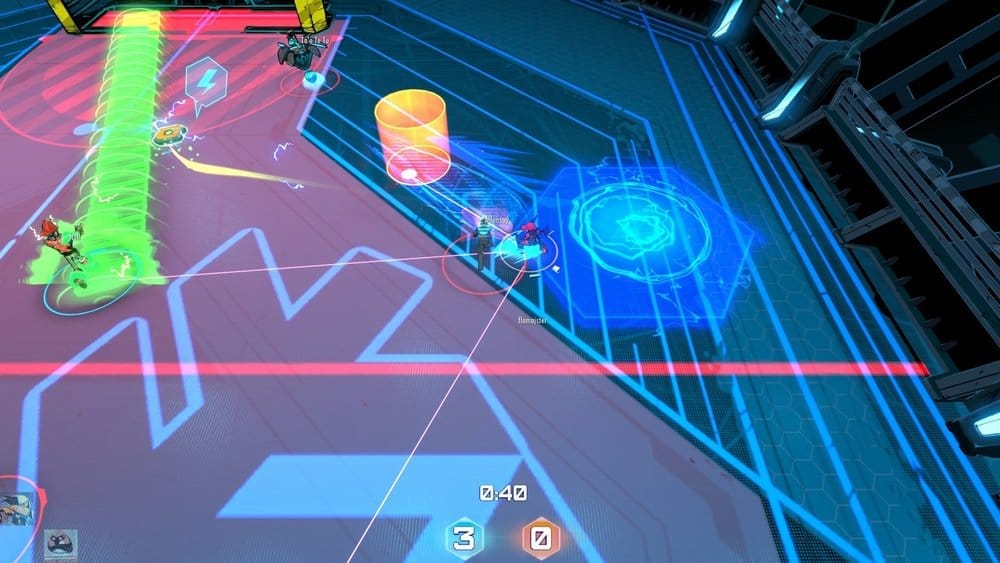
TechRaptor: Have you guys considered going back and remastering ACE, giving it another shot?
Atul: We've definitively been thinking about that, but it would need to be more than a remaster. We basically need to redo the entire game... because we did it in Unreal Engine 3, because it was a continuation of Tiny Brains, and that's definitely... we can't use a lot of the systems we've built. We need to redo them in Unreal Engine 4. Revisit the gameplay, and the mechanics, in a more modern perspective. So it's basically making a whole new game, so it's not trivial. So that's why we're not doing it at the moment, but it's definitely something we would like to do some day, because there's definitely a lot of potential in that game and all the learning we have, there's quite a few unique things that are innovative by today's standard basically. So yeah, it's just not... it would be a multi-million project, lets just say that.
TechRaptor: Fair enough. Now, after ACE, we got Stories: The Paths of Destiny, which probably, I think, put you guys... I don't want to say on the map, but it probably was your most... was it your most popular game?
Philip: At this point, yeah. Yeah.
Atul: It is our most popular game.
TechRaptor: Awesome. Well, so then, I guess we can say that put you guys on the map. So, I guess, you got done with ACE and the multiplayer thing was an interesting experiment, but now you wanted to go back to single player games. How did Stories come about?
Malik: Yeah, so, we decided to take a break from online, because we did two games in a row and online is very expensive in terms of effort and infrastructure and all that. So we wanted to simplify that, but at the same time we had interest in single player. For example, one of the things that we've been pushing since Stories is interactive narrative or interactive story telling. That's a topic that we find very interesting and we feel there's a lot to do on that, what kind of stories you can tell in games, how do you tell them. If you're not trying to borrow from movies and books, what's unique about telling stories in video game format. Stories is one of those things obviously, we've done kind of... it had a strong narrative component to it, and yeah. It worked out pretty well considering we only took a year to do it.
Philip: Eleven months.
Malik: Eleven months to be more specific. We are well known for making games excessively fast considering the quality that we output. Most people are surprised when the look at Stories and that we did it in only eleven months.
Atul: How many people were we on Stories?
Philip: Fifteen.
Malik: Yeah. We we only had fifteen and in eleven months.
Atul: Fourteen, almost fifteen. We bring in contractors for QA, we brought in a couple of people for QA, the audio people are contractors, the writers are contractors, but that's about it. The rest of everything is in house.
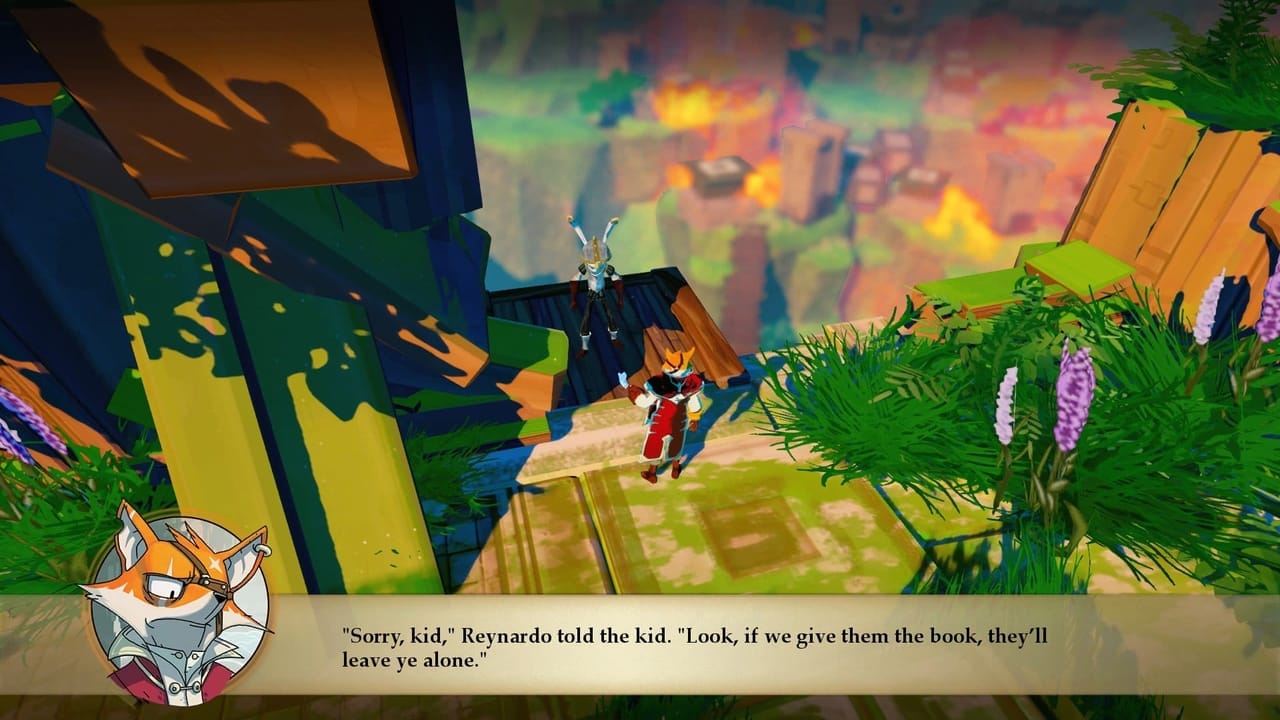
TechRaptor: That's really impressive for eleven months. It sounds like you would get stuck in a permanent crunch mode?
Philip: Actually, we've learned a lot. Tiny Brains was a lot of crunch. ACE was a lot of crunch only because we had a deadline pretty much every day, we had a live stream on Twitch where we'd play with actual players outside, so we had to deliver a build pretty much every single day, so that was a lot of work. By the time we reached Stories, we've gotten better with scoping and so I don't remember doing that much crunch.
Atul: I think we did three months of crunch of at the end.
Philip: Yeah. But towards the end.
Atul: Just to close the game.
Philip: It wasn't constant crunch.
Malik: It wasn't crazy times or anything like that. Overtime, but when you hear "crunch" you may think 80 hours a week, but we never do that.
Philip: No.
Malik: For us it's work/life balance, and, you know, not... doing things smart is very important, so that's something we always try to figure out how to do better. Doing overtime and crunching is a last resort because we're stuck and something went terribly wrong. But, as much as possible, we try to avoid that. We try to work smart and efficiently rather than brute force things, and even in the design of the games we do we try to figure out how we can make very cool content, very interesting experiences that do not rely necessarily on making a ton of stuff that requires everyone to work like crazy to deliver. So, you know, things like using time nukes, for example, as a narrative device allows us to not only create something interesting in terms of narrative, but it also allows us to not create infinite amounts of levels and content and all that. Anyway, for our next game, we didn't do much overtime at all.
Philip: Uh, Omensight, we did... about the same.
Malik: Yeah.
Atul: Yeah, same overtime. It was a longer dev cycle, but yeah.
TechRaptor: I'll get to Omensight in one minute, I actually got one more question for Stories. Right before Omensight came out, you guys went back and remastered Stories. Is there any particular reason in why you did that, or did you just want to touch up for the new game?
Malik: Well, uh, Stories was, we're pretty happy with the game experience, but performance-wise the game wasn't up to par with what we wanted it to be. There was a lot of general performance issues like low frame rate and things like that.
Philip: It was also our first game on the Unreal Engine 4.
Malik: Yeah. And it was one of the... I thought actually the first game release on Unreal Engine 4?
Philip: Before Fortnight came out.
Malik: Yeah. So a lot of the performance aspects of the engine, first of all, wasn't implemented back then from Epic, because they hadn't released a game themselves. On the other plant, ourselves didn't have a lot of experience with Unreal Engine 4 because it was our first game on the engine. So all that basically created that experience where, you know, the game... we thought we could do better, and we decided to actually do it because, if not for... both for us to have the satisfaction of delivering the game we wanted, but for our players and our audience, because that's something that we know people want.
Philip: So we pretty much finished Omensight, and we deiced "lets revisit Stories" with all the learnings and all the technical stuff, like the engine upgrades and stuff like that. Also, because the game came out in 2016, and we're in 2018, oddly enough a lot of the newer graphics cards were having issues with Stories just because of how the, I guess, rendering and all that stuff happened. So we felt that, for people that wanted to revisit Stories before Omensight, or people that will discover Stories because of Omensight, well... let's do this.
Malik: Yeah. And, you know, Stories is still a game that is alive. It aged well because of the experience and the art style and all that. It's still a cool game, even though its been released two years ago. So we want to keep maintain it and keep it as best as it can within our physical capacities.
Philip: Oddly enough, all the pop culture references still hold up.
Malik: Yeah! Yeah.
Atul: It still sells.
Philip: It still sells.
TechRaptor: And speaking of "still sells", is there any particular reason you guys think Stories is your best selling game?
Malik: Well one of the things is, uh... well, the market, again, was good for it. Also, it was likely easier for indies, even then, there wasn't endless noise.
Philip: So there were maybe 50 indie games that day on Steam, as opposed to 200.
Malik: [Laughter.] So it wasn't easy, but it was maybe easier to get visibility on games. We had much more support from, let's say, Sony back then. They still supported the indies a lot, and less so I guess today.
Philip: That team, I think, is no longer at Sony. They were our champions essentially at Sony. They helped us a lot. They put us on the blog, they featured us, we were on Ps+ at some point. A lot of the initiatives that they had for indies don't exist anymore in 2018.
Malik: Yeah. So there's a big aspect of that I think, relatively speaking. Timing helped, and the context for sure. Yeah. The fact that the game was good. [Laughter.]
TechRaptor: I guess that helps too.
Philip: It's a charming game! It's a feel good charming game.
Atul: Well the people also kind of wrote good things about it. They're like, even now, every so often we get messages from people still talking about Stories and what a great experience they had playing the game. I think that kind of, you know, kind of gives us a good sign of it's on-going life.
Malik: I guess in some ways it's true that, you know, there's no secret that... one of the things you need is a good game if you want it to work. So, Stories was a good game that some people really loved.
Philip: Word of mouth gave us the exposure I guess.
Malik: Yeah.
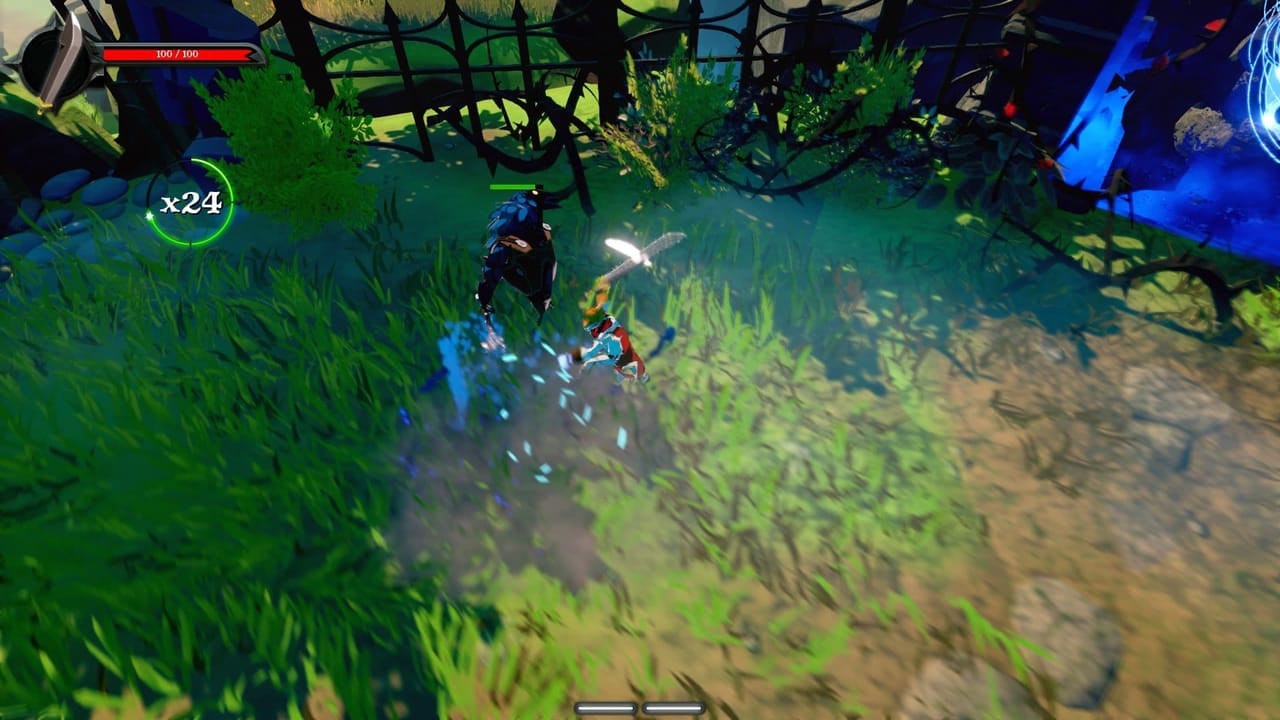
TechRaptor: Alright! So we move to Omensight, your most recent game.
Philip: Yay!
TechRaptor: I guess, you guys finish Stories, was Omensight originally supposed to be Stories 2, or did you decide you wanted to do something different?
Malik: Uh... it...
Philip: Conceptually, yes. Omensight was always going to be built on the foundation of Stories. Was it going to be a sequel? Um...
Atul: No.
Philip: I don't think we ever went in that direction, but the mechanics and the time loop passing, that was always going to come back for sure.
Malik: It was sort of a continuation because, after Stories, even though it's a good game, as developers we found we barely... there's a lot of things in Stories that we feel we barely explored or pushed in terms of interactive story and time loops, for example. Even in terms of gameplay.
Philip: Even in combat mechanics and platforming and all that.
Malik: Yeah. So it felt that we had more to do in that specific space basically, so we started working on Omensight with that in mind. Yeah. That's... I guess the answer to your question.
TechRaptor: Now, both Stories and Omensight deal with, in a way, time travel. So I'm curious what interests you guys in time and things changing it?
[At this point Atul shouts something, but I can't make it out as it immediately causes all three to burst out into laughter.]
Philip: I've said it multiple times in interviews. My favorite game is Chrono Trigger. My favorite movie is Back to the Future. So yeah, it's built in.
Malik: Yeah. And besides, you know, time looping and time travel being a really fun thing, even from a narrative point of view it's really cool because it allows us to have choices and consequences that are much more drastic than a more linear narrative experience, because you can basically make a decision that pretty much destroys the entire universe, then you can go back and do something else but you could experience, in that game, the possibility to destroy the universe and keep playing, it's not the end. It's just an episode in a way, and that can be a really fun experience because the choices you make can actually have a huge impact in what happens in the story or the world.
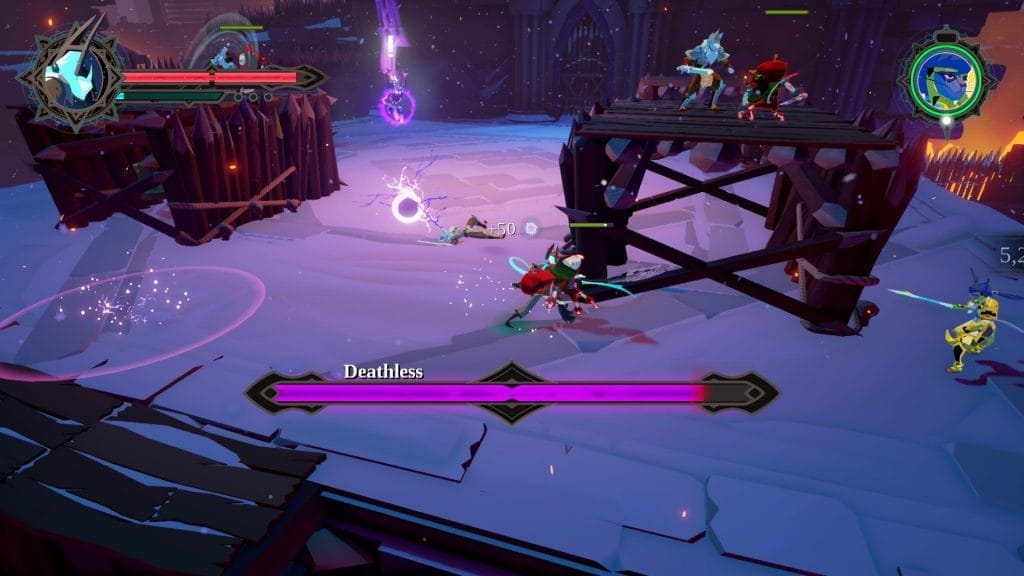
TechRaptor: And I guess, similarly, when you guys decide "hey there's going to be time travel in this game", how do you sit down and create a cohesive narrative rule set that, for the player, time travel feels right and not just "oh, whatever"?
Malik: Lots of headaches.
Philip: A lot of headaches. Lots of... I think I've become insane at this point, coming up with two time loop structures. Although the key points are usually "okay, where do we want the story to start and where do we want the story to end." Because, at the end of it, even though we deal with time loops, there's still a linear structure to the main story itself, right? Because the player will learn stuff and progress. So we deal with that stuff first, and then we sprinkle, because there's always an investigative component to the time loop gameplay aspects, so there's always "so where do we sprinkle the hints. Where do we want the player to know stuff and then move onto the next chapter" lets say. Essentially, yeah, that's how we built it. After that it's pretty much what makes sense, what choices make sense, what would the player's, in their fancy, what would they like to do in this and then how do we provide a satisfying ending to that episode, even though it's sort of... doesn't matter, but it still matters because it ends that story for that part.
Malik: Yeah. And, you know, always keeping that consistency in mind is one of the challenges of working like that, because you might think of a really cool episode where you make this choice and this happens, but if you're not careful it might contradict or break another one, another timeline if you will. So you always need to manage all the timelines at once, and I think that's what makes it complex to comprehend.
Philip: Lots of charts. Lots of documents mapping out which character is where, when, what are they doing and all that stuff.
Malik: Yeah, we have a ton of post-its on the wall to manage the timelines and keep a big picture in mind on what's going on at any given time for any given character and how they react to one of your choices, what would they do, and is it interesting first and is it consistent second. So it's all these things to juggle at the same time.
TechRaptor: One of my co-writers wanted me to ask "what is the best movie explanation of time travel, and why is it Looper?" But I'm guessing you'd say it's Back to the Future?
Philip: Yeah! I like that, uh... oh, it's... Looper. So what's the question, why is the best time travel...
TechRaptor: "What is the best movie explanation of time travel, and why is it Looper?"
Philip: Oh, right.
Malik: Why is it Looper? [Laughter.]
Philip: Why is it Looper?
TechRaptor: That's what he wanted me to ask, so...
Philip: What was it, what was the... its been a while, so what was the explanation for Looper?
TechRaptor: I'm going to be totally honest, I haven't seen Looper, he just told me to ask it.
Philip: All I remember from Looper is that he enters a box and then is sent back.
TechRaptor: It's one of those movies I need to see, but, well... Andrew, when you read this interview, sorry.
Philip: [Laughter.]
Malik: I don't know which one the is the best, but you know, all these movies have flaws. Even Looper has some weird things if you start digging in.
Philip: Because time travel is a paradox, and frankly can not happen unless... I think the science is sort of changing now, but it's not supposed to happen or it would have already happened. The reason why I enjoy Back to the Future more than Looper is because it's fun. It's just... people go on an adventure, and I guess... Looper is deeper in the sense, where it's like you're confronting yourself in a certain way as opposed to your parents in Back to the Future. But I don't know. Just nostalgia wise I like...
It's just a much cooler device. Because originally in Back to the Future he was supposed to be sent back in a fridge. That's the original script. But the produces were like "No! Let's buy a DeLorean. Let's make a car that is nuclear and it goes 88 miles per hour and shoots you back in time." That's awesome. That's awesome.
Atul: I think Looper jives with more people now with its much more darker tones.
Malik: If you like dark, speaking of dark, there's Dark the series, on Netflix. The German one. That's some really dark time looping. I found it quite interesting in wanting to see, basically, how bad time looping could go in terms of corrupting timelines. Which is I guess is as dark as you can go with a time loop.
Philip: Well I guess the other cool part about Looper is when he injures somebody it actually affects them. So that was... It's definitely... I don't know, it's kind of weird, their explanation of it is that even though he changed the timeline, it's still the same timeline? As opposed to Back to the Future. If you think about it, when Marty goes back, he's never been in that world. He's never been in that universe. The timeline completely changed. He doesn't know his parents, right? Because his parents were losers, they were watching, the uncle was coming out of jail and all that, but when he goes back his dad is a famous author. So he doesn't know that version of them. That's messed up.
Malik: I guess the cool thing about Looper is the real time impact.
Philip: It's the same timeline, it's always going to be-- there's only one timeline that you modify.
Malik: Even the memories of the older version of the character evolves as things happen, and I guess that's quite unique and interesting.
Philip: The same thing, if you think about Looper, if he touches anything or if he meets Bruce Willis, technically he should not even... like Bruce Willis should not exist, right? Like he should not even be in the past.
Malik: Wow. Yeah, it should be a quite different thing. It's... yeah.
Atul: Their own causality actually fails them all.
Philip: Well, it fails every time travel movie. It's just suspension of disbelief. Like, is it coherent in their universe? Does it make sense in that universe?
Malik: You have to establish your rules of time travel.
Philip: That's also one of the things when we do time loop stories is "what are our rules?"
Malik: Yeah. What are our rules basically.
Philip: Our shortcut is that we deal with episodes, so we don't deal with the long term effect of stuff, because it always resets. So that's one of the advantages we have.
TechRaptor: I'm glad you brought that back to Omensight because we went pretty far off topic there.
Malik: [Laughter.] You asked!
Philip: Yeah, you asked a time travel nerd stuff about time travel.
TechRaptor: Yeaaaah, that was a mistake.
Philip: [Laughter.]
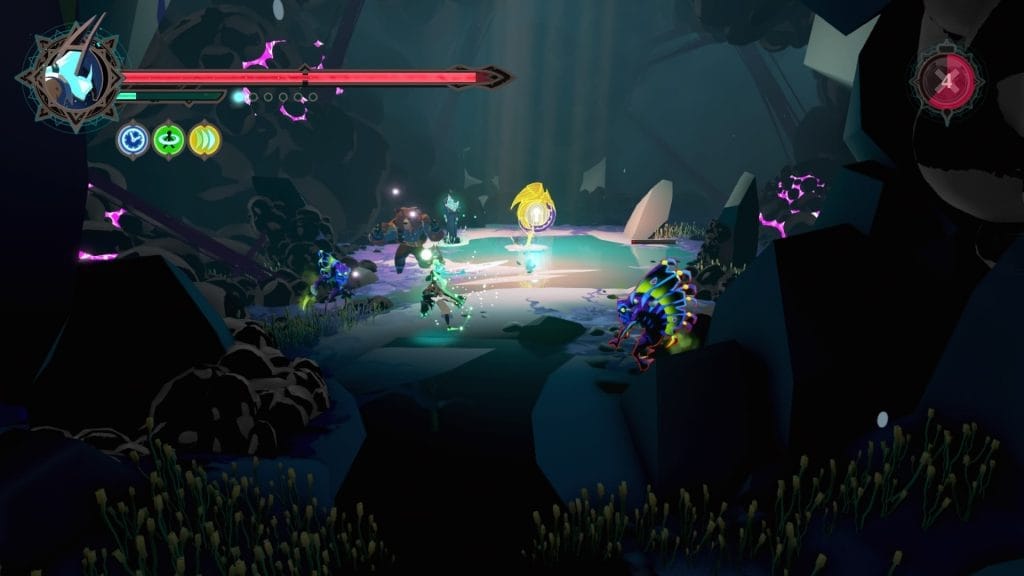
TechRaptor: Not really, that was really enjoyable actually. Alright, so, Omensight. After the game came out, you guys put out the definitive edition with the whole new ending sequence and all that. Why did you guys decide to go back and add more?
Atul: Player feedback mostly.
Malik: Well, their feedback, but also that's the game we always wanted to make. We just didn't get to it.
Philip: Yeah, so we already had plans for what to do next, but yeah. Essentially player feedback of "oh well, I'd like to unlock a path that I didn't do before." Also, like, there were a lot of comments about the darker ending did not sit well with a lot of players I guess. They were either... I don't know what the actual reaction was. I guess they were... they felt let down I guess by the ending? I don't know. How would you describe it?
Atul: I don't know. It's very dark.
Philip: It's a bleak ending.
Atul: Yeah. So, you know, I guess we had to come with a... it's almost a fan service ending where there is a way to really fix things in the ideal scenario and that requires extra timelines and things. So more content that we have to build to support that, going even further in the past and things like that to fix the root of the problem. So, yeah, but, you know it completes the game because it allows the players to explore much more of the timelines and the lore of the game, the story, the characters, and it goes deeper basically into that.
Philip: Also we address the-- there's sort of more choices to the difficulty of the game, so you can play at, you can have the hand holding mode which is the normal mode where we give you all the hints for your investigation and stuff like that. But there's also a true detective mode where we don't give you any hints, you have to write it down like a private eye, you have to figure it out on your own.
Malik: Yeah. That's one thing we always wanted to have. It was there in the game, but it wasn't super clear. Because one of the things with Omensight that we wanted to do was really bring out the gameplay aspect of the interactive story. So you wouldn't just do the loops or the choices for flavor or simply for the enjoyment of a good story, but also because you're investigating pretty much a murder basically. So then, for that, it's either, you know, you don't feel like a real detective or it's too complicated or whatever, so we have hints and a detective board that's built automatically for you, or if you really want to dig in and be invested in that investigation then there's a mode for that where they basically give you no hints and it's up to you to solve that murder mystery. I guess there's different... I guess it's a difficulty mode for the narrative gameplay of the game. Which is something we had to come up with because there's not much reference in terms of game experience.
TechRaptor: Was the response to the ending really that... were people really upset about the rather darker ending?
Atul: It was more...
Philip: I'd say it was more... well, reading the comments online was 50/50. Because, thematically, the ending fits, right? It's not... as opposed to Stories, the world of Omensight is a bleaker one. It starts with war, it deals with a lot of politics and backstabbing, a lot of conspiracies and stuff like that. Tonally, and thematically, that ending fits, and a lot of people defend that ending. But, I guess, the other side was that people were "well, I play games to be entertained, not... like, the world is bleak enough, just give me something happy." So it was more divisive than... like, there was not a majority on either side.
Malik: Yeah, it's a matter of taste, really.
TechRaptor: You guys are done with Omensight now, we got the whole extra ending, you ported it to the Switch, are there any other plans with Omensight or is that it with this game?
Malik: We can never say that's it with anything. That's it for now, lets leave it there. We started working on something new and all that. But that doesn't mean... we came back to Stories, what, a couple years later? That doesn't mean we'll never update Omensight for whatever reason, content or improvements of any kind. But, for now, we're moving on to something else for the moment.
TechRaptor: And, this something, is Project Witchstone, right?
Malik: Yep.
Philip: Exactly.
Malik: It's the working title, it doesn't have a real title yet because we've been working for, what, two or three months so far on the project.
Atul: September.
Malik: Yeah, since September.
TechRaptor: So with your guys work pace, that means it's like half done already, right?
[All three laugh.]
Atul: Yes, sure! Yes, yes, absolutely.
Philip: It's actually this time we're...
Atul: We're trying a new approach.
Philip: We're trying a new approach. We're doing things, I guess, smarter, but at the same time that means taking our time and actually doing a lot of research, figuring stuff out, learning the tech. As opposed to "make it happen", right? Make it happen, but also make it sustainable in the long term.
Malik: Especially considering the nature of the game, which I don't know how much I can...
Philip: Just go for it!
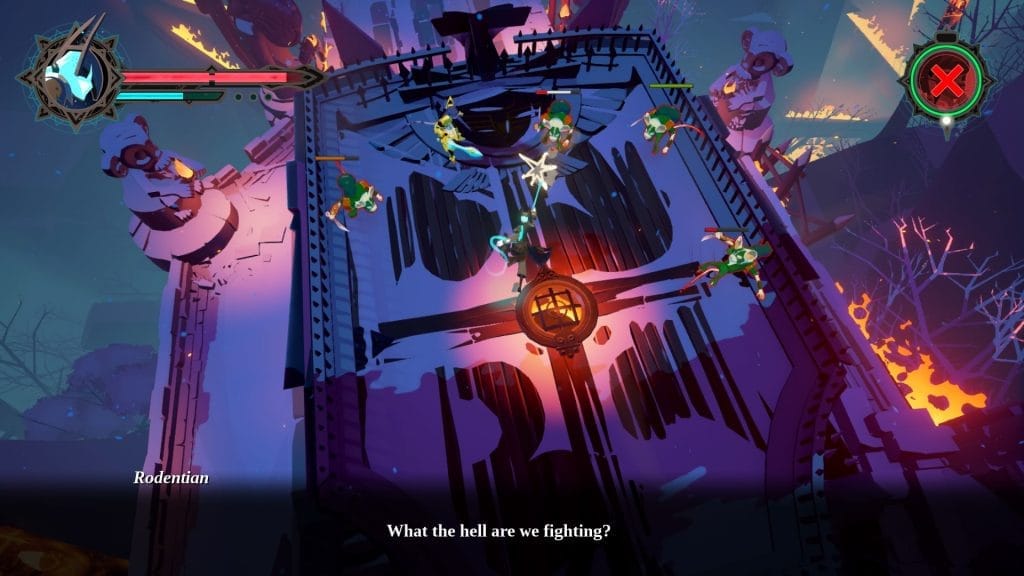
TechRaptor: Yeah, tell me a bit about Project Witchstone, I want to hear.
Malik: Yeah, so, you know, for our next game we want to continue with... I mentioned we were interested a lot in story telling or narrative in video game form. Stories and Omensight were both kind of experiments and sort of research too, in that aspect. There's more in to what we researched and towards getting to those results than what we actually delivered. Out next project is a continuation in a way. It's, by no means-- it's not a sequel per say, but it's a continuation, from our perspective, in terms of what we're interested in.
The next game, I guess, is much more ambitious in terms of what we want to bring, because both Omensight and Stories we wanted to push choices had consequences, make them really meaningful and impactful, but we were limited by the fact that there was only a set limit of choices you could make within the game. You don't have full freedom in how you want to resolve the investigation, for example, in Omensight, or what you want to do in Stories in approach to saving the world. In this case we want to give full freedom to the player in terms of choices, and basically that means no branching approach and a full systemic approach to narrative, which is super ambitious actually.
TechRaptor: Now is this game going also have time travel?
Malik: Mmm... no.
Philip: Not this time. Not yet, anyway.
Atul: Not yet, but you never know. We're still early in conception so...
Malik: Maybe. But for now, no.
Philip: If there's an item to time travel, I'd be down for that. But yeah.
Malik: Solving the challenge of having choices that are one hundred percent driven by the player is already big enough. Adding the time travel aspect... we'll see after that. But, you know, it might actually be easier because of the systems and technology that we're building, which involves a lot of complex AIs and things like that.
TechRaptor: Is this game going to take place in the same world as Stories and Omensight, or is it going to be its own thing?
Philip: At the moment it's heading in the direction where it's self-contained, so it's sort of its own universe. But we like to sprinkle little hints of how these universes are connected. Even if Omensight is not a direct sequel to Stories, it still happens in that universe and we sprinkle little tidbits here and there to link the... I guess the Spearhead Universe or something? I don't know what we'd call it.
TechRaptor: It's the Spearhead Cinematic Universe.
Philip: Yes, that!
TechRaptor: Alright, well, do you guys have any last comments about your games, last things you want to say?
Philip: Yeah. Check out Project Witchstone, which we'll be presenting... well we'll have stuff official for PAX South, if you guys are there. Also we'll be at PAX East, so check that out. Yeah. Anything else?
Malik: No.
TechRaptor: Well we will be at PAX East, so I'll get someone on that.
Philip: Sweet.
TechRaptor: Alright, well I'd like to thank you guys for taking the time to talk with me, this has been really interesting, and I wish you guys the best with Project Witchstone.
Malik: Thanks.
Philip: Thank you.
Atun: Thank you.
We'd like to once again thank Malik, Philip, and Atun for taking the time to talk with us.
Have a tip, or want to point out something we missed? Leave a Comment or e-mail us at tips@techraptor.net
